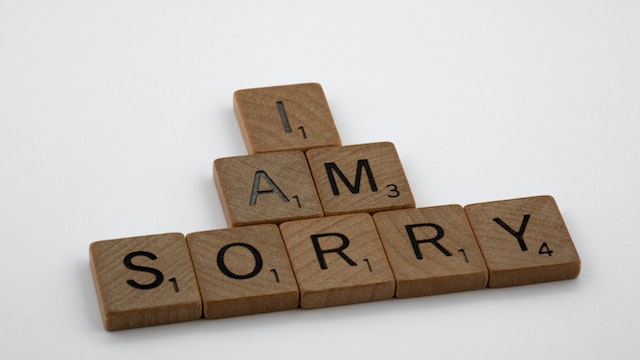It is accepted wisdom in public speaking that you should never apologise.

But I recently made the case that there are few guidelines for public speaking.
- Is it a strict rule to "never apologize"?
- What is the justification? What is wrong with expressing regret to the crowd?
- What circumstances, if any, warrant an apology?

Is it a strict rule to "never apologize"?
No.
It is not a general rule, but too many speakers make unnecessary excuses for too many things.
What is the justification? What is wrong with expressing regret to the crowd?

This recommendation’s two main justifications are as follows:
- Apologies typically do not result in much gain.
- You risk losing credibility.
Think of a scenario where you are creating a presentation. Now that you have gathered a wealth of data, it is time to edit your writing. You must consider whether each element—a slide, a prop, a narrative, or a joke—contributes to the main idea or takes away from it. Is keeping this going to be a net gain?
The same query might be asked regarding whether to include an apology in your presentation. The benefits of saying sorry are frequently extremely little. On the other hand, you risk losing the audience’s trust. For instance, if you apologize for not being an expert, your audience will start to wonder why they should be listening to you.
Pro Tip
What circumstances, if any, warrant an apology?

There is no crystal ball that can predict when you should apologize. Having stated that, you might find it useful to think about the following issues:
First, can the audience really understand what you are sorry for?
- Never reveal your nervousness to your audience, Norman Wei recently said. Usually, the audience is ignorant of your anxiety. Your butterflies cannot be felt by them. They have no idea whether you slept poorly due to this presentation.
- The same goes for forgetting to include something you had planned; you do not need to apologize. Only you are aware of the strategy. The viewer will not make a guess.
How to respond:
- Do not draw emphasis to the bad. They will not do anything but sidetrack you and your audience.

Do you apologize because you truly regret it or just because you are embarrassed?
- If the latter, it is likely that your apologies will just highlight and magnify the cause of your humiliation.
- For instance: "I apologize. To put these slides together, I hurried. The caliber of your slides has already been assessed by the audience. They are unlikely to think, "Oh, that's okay. " They do not care that you are humiliated. No issues. They are more inclined to think, "You didn't prepare well enough. My time is being wasted by you.
How to respond:
- Make sure to thoroughly prepare so that you will not have anything to be ashamed of or apologize for. Additionally, your confidence level will rise, and your delivery will be enhanced.
Action Item
- Are you expressing regret for something that was entirely beyond your control?
- Example: A very loud air conditioner that has just "clicked on" interrupts your presentation. Others may choose to disregard it. Others can apologize for their own disappointment. Oh, my apologies.
- For instance, the classroom where you are scheduled to teach a course is too tiny to properly fit your pupils.
How to respond:
- Act forcefully if there is something you can do that will enhance your ability to communicate your message. "Why don't I come closer so we can hear each other over that air conditioner?"
- If there is nothing you can do to have influence, you can try using suitable comedy to lighten the tension. Recognizing the issue without offering an apology is crucial.

What if I must make an apology?
- One of the speakers I coached once told me about a speech where she felt compelled to apologise. She talked about how her capacity to speak was being badly impacted by a deep sense of guilt. Ideally, she would not be affected by these emotions, but for her, that was not the case.
How to respond:
- If you feel the need to apologize, do so immediately and truly. Do not think about it too much or say it again. Simply continue your lecture. You may or may not lose credibility points from the audience, but there are far worse things you can do.
- Sincerity is essential. A genuine apology might even win the audience over. Everything depends on the situation.







